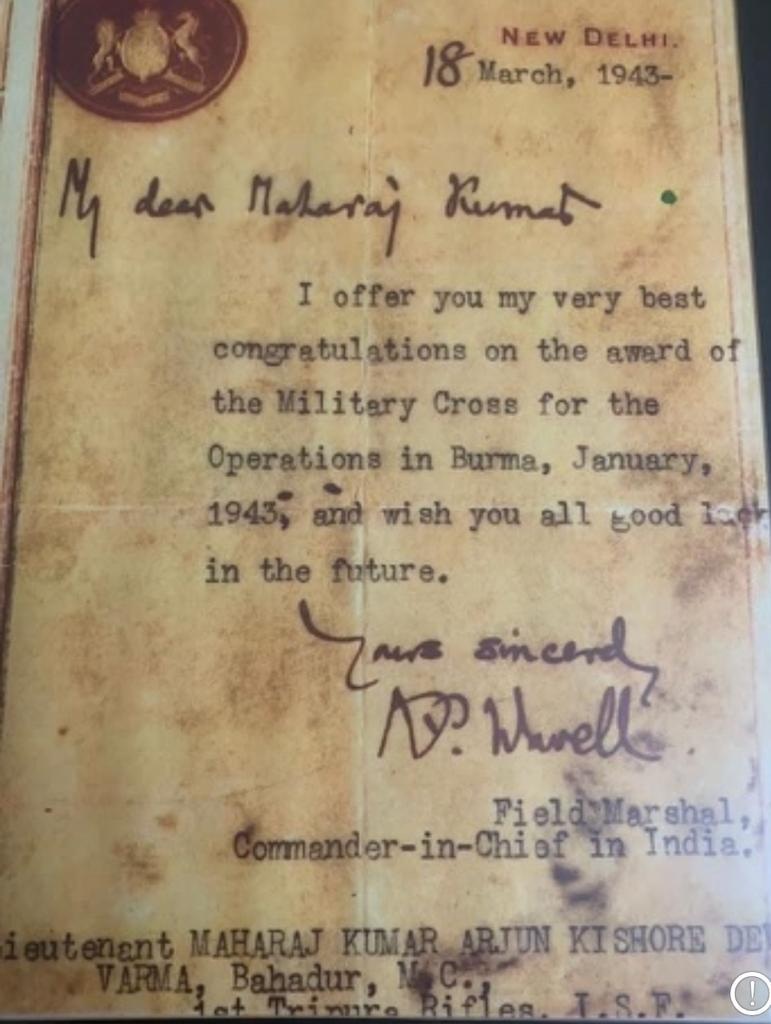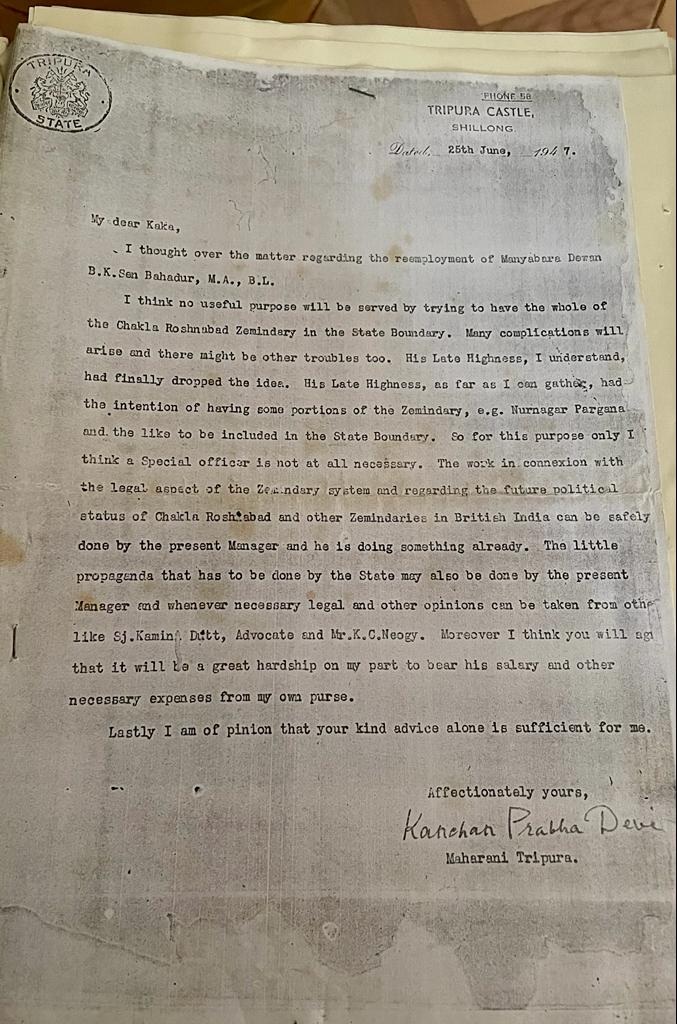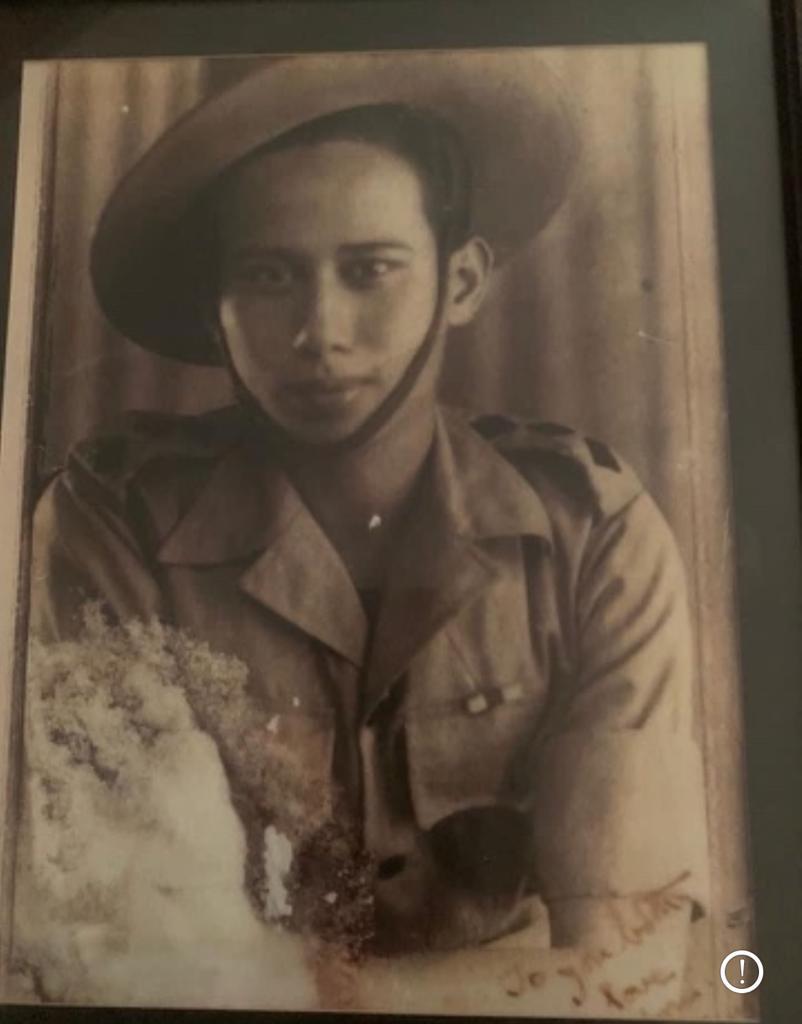Was discussing with some newly inducted ministers and told them that we believe that demand based politics must become development based politics that is the meaning of” Sab ka Saath Saab ka Vikas”.
All demands rise from same root – Development and when it is not well balanced many more demands rise like identity, cultural, political, ethnicity, land ownership etc etc. This demand based politics is a continuous process . If one was to cite the politics of Tripura as an example of this phenomenon; a look into its origin becomes imperative.
When the merger document was signed by the Regent Maharani Kanchan Prava Devi with the Union Government in October 1949 thereby ending the royal rule of centuries. This document mostly dealt with the private property of the ruler, his privy purse ( some sort of a yearly pension), the privileges that he would enjoy as ex-ruler, handing over temples to the government. However, after the Bangladesh Liberation War of 1971 the then Prime Minister Indira Gandhi brought an amendment to the Constitution and scrapped the privy purse and privileges of ex rulers by passing the 26th Amendment in 1971. She argued for the abolition based on equal rights for all citizens and the need to reduce the government’s revenue deficit.
The Tripura Merger Agreement also stipulated that all civil servants of the royal government would be absorbed into the state service, their pensions, pay etc being protected.

On the other hand it did not provide anything for the Tripura Rifles, the much decorated royal army, which had won two Miltary Crosses ( equivalent to Mahaveer Chakra) and many more laurels in the Second World War. They lost their jobs and had no livelihood. Most of the troops were indigenous people of the state. A handful were absorbed into the Assam Rifles that was all they got. This glaring discrimination, which added insult to injury , led to a violent movement called Sengrak ( Clenched Fist in the local language – Kok Borok).
The communist built their base fanning this discontent and deprivation of Indigenous people. I had the opportunity to meet with a late Indigenous senior communist leader and MLA, who was in the Tripura Rifles, he narrated the hardships and dishonour he faced, once the royal army was disbanded. I could see in his eyes , the disillusionment that after so much hard work and loyalty to the throne, there was nothing for him and others like him. My father too was in the British Army ( 7th Rajput Regiment) and served in the World II in the Arakan Front where the Tripura Rifles was stationed and he told me that the commander in chief of the British Army presented two canons to the royal army as a token of their bravery ( I saw these later on). The story of Sengrak this was that of loyalty that was not honoured.
There is an interesting letter written by Maharajkumar Brajendra Kishore ( Lalu Karta) who was prime minister of the kingdom and a uncle of Bir Bikram . It was on the subject of retaining Comilla, now in Bangladesh within the territory of Tripura as it was the Maharaja’s territory. But the reply from the Regent was far from positive. She sent Bankim Karta a great musician and her ADC to handle matters. The picture of this letter is here for the readers to see and to read , so that it requires no further elaboration. If Comilla was retained then perhaps the demand based politics of division of the state, deprivation, empowerment , land rights, identity crisis etc may not have risen. The Indigenous people would have inhabited hill Tripura and others the plains of Tripura, as it was done so down the centuries.

Further it would have saved thousands of homes and lives of people living there , who were driven out of East Pakistan based on religion and compelled to seek shelter in Tripura. My father, who played a major role in the merger with the Indian Union, always recalled how Maharaj Birbikram told the Vicerory’s representative that all lands and territory that was taken from Tripura kingdom by the British, must be restored to the original owner ( Maharaja), prior to merger with Indian Union. He passed away prior to merger. The letter that I have quoted and put up for readers, states something just the opposite. What is true and what is not is not for me to judge. My sole intention is to place facts before the readers without being judgmental or opinionated, so that each one can take a view.
The story of demand politics began with demand for implementation of Indira- Mujib agreement post Bangladesh Liberation where it was said “cut off” date would be 1971 to it was added the demand for inner line permit. With time and fatigue the demand came for increase of 3 seats, which was done through an accord with an extremist group – Tripura National Volunteers. The supremo of the this outfit was made a chairman of a state organisation and the cadres were somewhat rehabilitated to what was called to join the so called “ mainstream “. Much later came the demand for 50 per cent reservation of legislative assembly seats for ST. Then came demand for Tipraland and subsequently for Greater Tipraland , now interlocutor and constitutional solution. It’s good from demand to solution , whatever it maybe but without the partition of our state.
Tripura too saw the growth of numerous extremist groups in the 1990s and several accords to bring to an end the discord prevailed. Most of these accords became archival material. The accords were mainly regarding facilities to be granted to
The seed of discord was sown in 1980 by communal riots under the Leftist rule . On the other hand these accords were eloquent in their content but on the ground, real development of the indigenous people remained a distant dream. As a result of which demand based politics and regional parties came and went, some enjoyed power for sometime, others kept making various demands at various times.
Of course the process of keeping Indigenous people of Tripura away from the mainstream development began with the Communists , who wanted a foothold and a solid vote bank in Tripura. They claimed the mass literacy movement during the Maharaja’s rule known as “ Jana Shiksa Andolan ” as a uprising against monarchy , which is far from the truth. They also formed “Gana Mukti Parishad” the name suggested some sort of a liberation front for the Indigenous people. As the communists strengthened their hold on the Indigenous populace, winning elections to parliament, the congress realised it could not sit idle any longer. So they brought in settlers from the neighbouring country as a counter move. The Indigenous people became a pawn in the chessboard of power play.
Maharaja Birbikram knew that his people had an interdependent relationship with their forests and realized that with changes that were approaching, there was an urgent need to protect them. In 1939 he reserved 530 sq miles of forest for them and in September 1943 he went on to reserve 1950 sq miles of plain lands for his indigenous hill people in order to encourage them to carry out settled cultivation.

In an article” Disaster In Tripura” BBC correspondent Subir Bhaumik, who hails from this state wrote, “In 1943, King Bir Bikram had earmarked 1950 sq. miles as Tribal Reserve, but in 1948, the Regent Maharani’s Dewan A.B. Chatterji vide order no. 325 dated 10th Aswin, 1358 Tripura Era (1948 AD) threw open 300 sq. miles of this reserve …….,”
This was the beginning of these reservations being swept away on some pretext or the other .
We still have villages in remote tribal areas such as Gondacherra with name like Baees card Taees card ( twenty two twenty three cards) reflecting the number of settlers with refugee cards. Eventually the top tribal leader of the communist was defeated in the ST parliamentary seat.
But once the communist got their cherished foothold on power for 25 years at a stretch (1993- 2018 ) – Gana Mukti Parishad ( GMP) due to the ill health of it’s foremost leader Dashrath Deb and subsequently after his demise GMP was sidelined )some sort of a “use and throw policy” ) it is proved from the election results of 2018 only 2 ST seats out of 20 and now in 2023 when their party’s secretary being from the indigenous community was compelled to contest from a general seat ( a wise political decision because in 2023 , no ST reserved seats out of 20 has gone to them). At present 13 ST seats with a regional party Tripura Motha and Seven with BJP including 1 with alliance partner another regional party IPFT.
With this background of “demand and supply politics “ supply has never met demands that is the cause of continuous shifting of goal posts or demands by various outfits over the decades. But things are changing fast.In the sixth schedule area TTAADC election ( more or less 2 years back) BJP on its own one 10 out of 11 seats it contested, now in the 2023 Assembly Elections it has won 7 seats – the 1 seat of IPFT is also a win for BJP for the IPFT has almost fully eroded.
I have taken Tripura just as a case study for North East Politics for it serves as a good example of how the Indigenous people are getting tired of demand based politics where demands change and transform just for garnering votes and to build vote banks or for entry into power.
It is now for the state governments in the North East to realise, what the PM says, “Sab ka saath, Sab ka Vikas, Sab ka Viswas and Sab ka Prayaas. “ To make that last mile delivery of government schemes, projects, benefits, services to include and involve those living in the margins. It’s important to take them-along on the path of development, to remove imbalances, which lead to demand based politics and vote banks, polarisation and counter polarisation , which are dangerous disruptions.
An Afterword: This is the truth as I perceived it in my political journey of a few decades. I was fortunate to have worked with outstanding leaders, who are no more like Shyama Charan Tripura, Nagendra Jamatia earlier and especially from 1999 when TUJS allied with BJP. I was also fortunate to have discussed so many topics with the veteran leader Late Nripen Chakraborty the former CM and who was close to my mother. He once gave me a Bengali book written by him “ Longtrai Aamar Ghor meaning “ Longtrai ( the remote hill range of Tripura) Is My Home.” !and asked me read it and make English translation and show it to him. I regret it never happened. I went through the book after his demise . It spoke about his travel through the jungle on foot to indigenous hamlets and the dispossession they suffered. I used to visit him in the MLA hostel when he was expelled from the communist party . He lamented that the actual comrades ,who were the indigenous people were being ignored by the party. His closest disciple was the Chief Minister and here he was expelled from the party, which he built- an irony of hard politics.
Late Congress former CMs Sachindralal Singh ( his family still In contact with me) and Sukhumoy Sengupta were like family members being connected to our family.
As a youngster I used to overhear so many discussions that took place in our house “adda” especially with my mother, who was always keen that the Indigenous people were not marginalised. She was the president of Adibashi congress but the congress objected ,as to why they should be two congress parties , so she resigned and with her came along many educated indigenous youth, who later formed the Tripura Upajati Juba Samity and the congress formed ST cell in their party replacing Adibashi Comgress.
Somehow or the other I grew up in a home that was charged with adda ( lively informal discussion)on politics, history, art, music and literature what a combination !!!When he had time my father, who was the Development Commissioner and later chief secretary would chip in with his official anecdotes. It was after I met some of the BJP stalwarts, I always felt this party was different, they spoke of “ punarnirman” restoring or rebuilding India to her former glory through the Dharmic and inclusive dictum of:
ayaṃ nijaḥ paro veti gaṇanā laghucetasām।
udāracaritānāṃ tu vasudhaiva kuṭumbakam॥
English translation:
This is mine, that is his, say the small minded,
The wise believe that the entire world is a family.
(Source: Maha Upanishad 6.71–75)
Therefore it was not of making India a mere shadow of the WesternWorld. It was of reaffirmation of our value system, which in one Indian word is DHARMA That’s how I drifted into politics.
(The views expressed in this article is that of the author and in no way related to any organisation political or social that he is associated with..)


